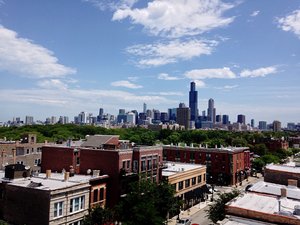Congressman Dan Lipinski is the U.S. Representative for Illinois' 3rd Congressional District, which includes parts of the southwest side of Chicago, southwest Cook County, and northeastern Will County.
Lipinski, a Democrat and a member of the House Transportation and Infrastructure Committee, hosted a panel discussion at TechNexus on Monday with autonomous vehicle technology experts.
The Chicago Business Journal spoke with him to find out what he's learned about driverless cars and the government's role in safely deploying the technology.
This is the fourth panel you've hosted on the issue of autonomous vehicle technology. What are some important things you've learned in your discussion with the experts?
The first thing is that this is coming more quickly than anyone realizes. There are cars that are going to be out on the market in the next year or two that will have features on them that will allow the driver to let the car drive itself on highways. I've been the passenger in cars that are autonomous, and I've seen the technology is there.
But there are a lot of things that still need to be worked out. It's not just the technology itself, but there are also questions about how the vehicles are going to communicate with other vehicles, with cyclists, with pedestrians, with the infrastructure, and those are questions that need to be answered.
How far away are we from seeing driverless cars on the road, beyond the testing phase?
I think there will be cars that are on the road in the next year or two, where if you're on a highway that is properly marked, that has good striping on it, and as long as the weather is good, you will be able to take your hands off the wheel and let the car go by itself. I think it's going to be step-by-step that this happens. There will be more and more situations where the car will be able to drive itself, and fewer and fewer instances where the driver will have to take control of the car.
A question that I like to ask at these roundtables is: A child who is born today, will that child have to learn how to drive a car? I get various responses to that. Some people say, "Oh no, they definitely won't have to learn how to drive," and others say, "Sixteen-year-olds who want to learn how to drive can, but they won't have to."
I'm 50 years old, and I know that kids today are not as connected to the idea of driving. It's not as important to them as it was to me when I was 16 years old. The connection to the car itself and to driving is starting to change a little bit.
What are some potential pitfalls that could delay the deployment of autonomous vehicles, and how do states and cities avoid them?
First of all, the question of safety is always going to be there, and it's important that we maintain it. Today, we are much more accepting of human error than we are of computer error. People are saying we can't put these cars on the road until we are 100 percent assured of not getting in an accident. Well, we know that human drivers are not 100 percent assured of not getting into an accident. How safe does it need to be? This a question that all lawmakers are going to have to grapple with.
There is also the infrastructure and getting it connected to vehicles. You can have a vehicle that is able to drive itself by looking at the road, but it will be much more efficient if the infrastructure is communicating to the vehicle. We need to work with these companies on getting these cars on the road so that we keep people safe but we don't go too far and strangle innovation and it doesn't happen here.
In your mind, what is the federal government's role in the testing and eventual commercial use of self-driving vehicles?
From the government side, infrastructure is very important. I'd say governments at all levels, federal state and local, need to be involved in preparing our infrastructure for autonomous vehicles.
The U.S. Department of Transportation is expected this week to issue guidance on connected and autonomous vehicles, and we will see exactly what is contained in that guidance. (NOTE: The USDOT unveiled those recommendations late Monday. Read them here.)
I think the federal government is going to have to lead the way in this to give state and local governments an idea where the federal government believes the safety is at this point and what recommendations it has about what can and should be allowed on the roads today.
What do you think of a recent proposal by some Chicago lawmakers to ban or severely restrict autonomous vehicle use in the city?
I think some of the safety concerns right now are because of a lack of understanding about what is possible right now and what is happening right now, but it's mostly up to local governments about what they're going to allow. There's a lot of different directions that municipalities are going on this and it would be good to see a bit more uniformity.
This interview was edited and condensed for clarity.
Click here to get the free daily Chicago Business Journal newsletter and breaking-news alerts.








